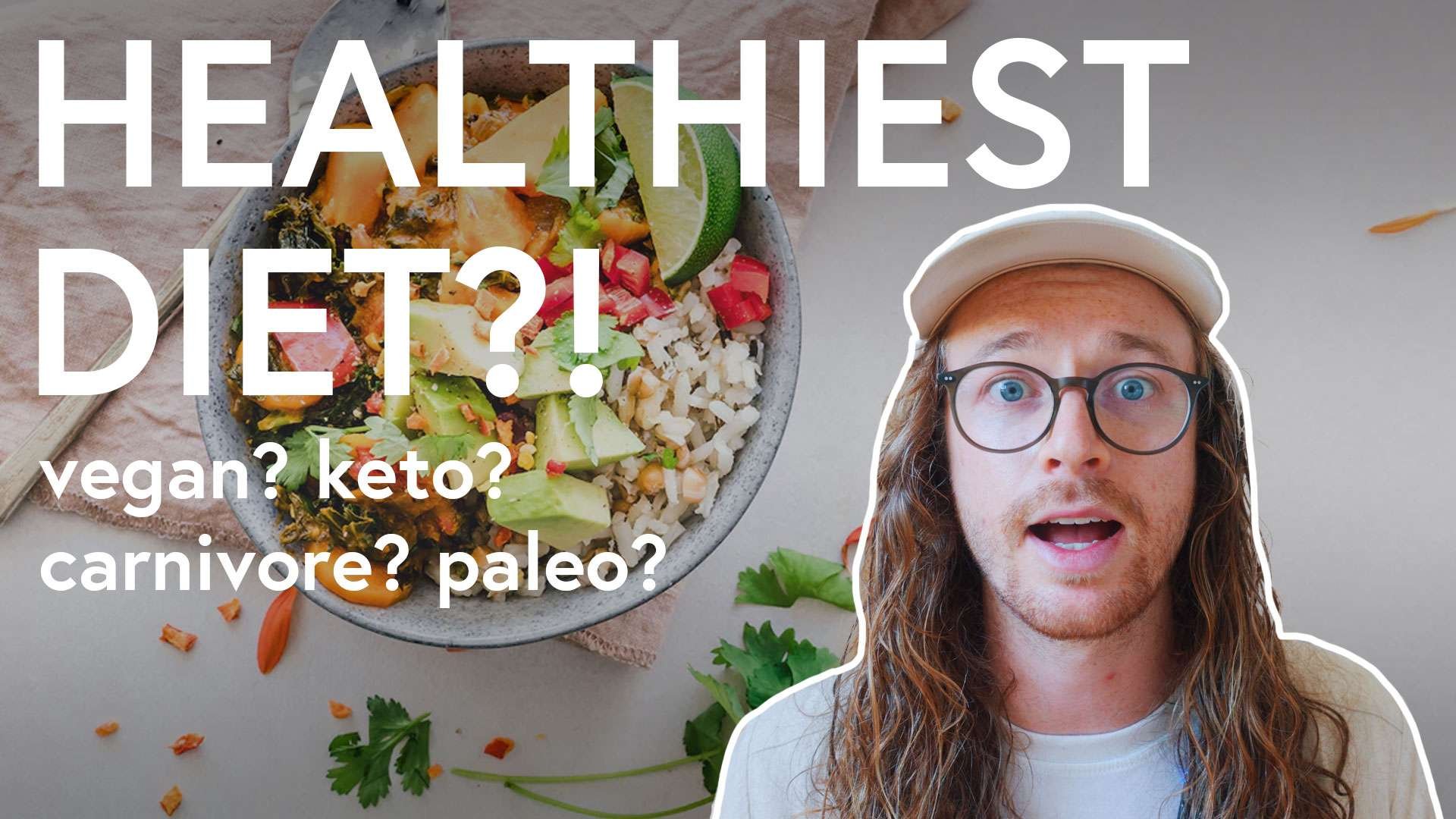In this article learn about how:
- The world’s healthiest diet is often a subject of confusion due to conflicting information online.
- Renowned experts agree on a foundational diet that includes more whole foods, vegetables, and less processed foods.
- There are key points like legumes, fruits, nuts, seeds, eggs and fish that everyone agrees on.
- Dietary guidelines in different countries echo these fundamentals of a healthy diet.
- Individual variation is important when tailoring dietary needs.
In the quest for optimal health, one question remains at the forefront: What is the world’s healthiest diet? This question is arguably the holy grail of nutrition science. However, with an overwhelming amount of information available on social media and across the internet, it can be challenging to discern fact from fiction. Let’s get into it!
Watch the full video on my YouTube channel
The Foundation of Healthy Eating
We all agree on certain things that are universally unhealthy – processed foods, sugar-sweetened beverages, refined carbohydrates and trans fats are recognised as detrimental to our well-being. There’s no one out there calling for more donuts or candies in a healthy diet!
This understanding brings us to a foundational diet for health. Michael Pollan summarised this perfectly in his book after interviewing numerous experts worldwide: “Eat food. Not too much. Mostly plants.” While this sentence provides an excellent summary of what constitutes a healthy diet, it’s obviously a lot more complicated than that.
Key Points of a Healthy Diet
A consensus among nutrition experts highlights some key points for a healthy diet:
- More whole foods
- More vegetables
- Less refined grains
- Less refined sugar
- Less processed foods
These points are universally agreed upon by different dietary communities — from keto enthusiasts to low-fat vegans. A global shift towards these principles could significantly improve overall health and combat prevalent issues like diabetes and heart disease.
However, despite this knowledge, most diets in Western developed countries are comprised of mainly processed foods.
Delving Deeper into Specifics
Building on this framework of healthy eating brings us to some more specifics that all experts agree on:
Legumes: Beans have been vilified due to their lectin content; however, cooking them effectively removes lectins making them not only safe but also an excellent source of protein.
Learn more about lectins in beans
Fruit: Despite its sugar content, fruit isn’t harmful but rather beneficial due to its food matrix — polyphenols and fiber that dampen blood sugar response and feed beneficial gut bacteria.
Nuts and Seeds: Yes, they contain fat — but it’s mostly unsaturated fat beneficial for cardiovascular health, brain health and promoting healthy skin.
Eggs: While eggs do contain cholesterol, dietary cholesterol doesn’t significantly impact our cholesterol levels — though sourcing matters due to ethical considerations regarding egg industry practices.
Fish: Generally considered healthy due to their Omega-3 content essential for cardiovascular health and brain function.
Other considerations include poultry (organic free-range vs deep-fried), grains (steel-cut oats vs white bread), dairy (plain unsweetened yogurt vs sweetened varieties) and red meat (unprocessed vs processed meats like hot dogs).
Most nutritional guidelines globally reflect these principles — advocating mostly whole foods predominantly plants with room for some animal products focused on eggs and fish which have shown the best health outcomes.
However tempting it may be to engage in controversial debates about veganism versus carnivore diets online — focusing on these nutrition basics will yield far greater benefits for our overall well-being.
Learn more about eating a balanced diet
Guidelines & Misconceptions
Contrary to what is shared online blaming dietary guidelines issued decades ago for today’s rampant health issues — if you examine guidelines like those from the United States updated every five years since the 1980s — they essentially mirror what we’ve discussed above: watch your calories, avoid added sugar & excess saturated fat while ensuring enough exercise.
Learn more about the history of USA dietary guidelines
The core recommendations remain consistent whether we’re addressing cardiovascular disease or Alzheimer’s or diabetes with diets like the Mediterranean diet having some of the strongest evidence to support beneficial health — rich in whole unprocessed fruits & vegetables along with legumes, whole grains plus some fish & eggs with occasional red meat & poultry.
Learn more about the benefits of a Mediterranean diet
Finding What Works For You!
While these principles provide a solid foundation for good nutrition — individual variation plays an essential role in customising dietary needs based on genetic factors, lifestyle, food preferences and environmental influences as well as availability of particular foods.
It’s crucial not to lose sight of this. It can be tempting to try different supplements, superfoods and health hacks but it’s the basics that determine the majority of our nutritional health. These extra things might only be 1% of the whole picture.
For example focusing on drinking ‘miracle alkaline water’ while continuing to consume a diet of processed foods won’t yield significant health improvements — it’s essential first to establish a solid base of a healthy diet – and then we can go from there and try other things.
You can take these central themes of a healthy diet and apply them to your specific situation. Do you feel better when eating less carbs and higher fat? Go for it – same if you feel better eating more carbs and less fat! We’re all different and the thing is with recommendations – they’re made for the average person, yet no one is an exact average. Make sure you always listen to your body and find what works for you.
A Balancing Act: Carbs, Protein & Fats
A study examining changes in intake of carbs protein & fats over time (1999–2016) showed interesting revelations about our current eating habits:
(it’s important to note this is data from a US cohort, but it’s largely reflective of the intakes in other ‘western’ countries.)
Approximately 45% caloric intake comes from processed carbs known to be detrimental for our health; only about 8% comes from whole carbs. This suggests there’s certainly room for lower-carb diets provided they focus on reducing these processed carbs rather than whole ones.
At the same time increasing consumption of whole carbs drastically might prove challenging – imagine consuming vast amounts of beans legumes wholemeal bread fruits & veggies! It’s certainly possible but won’t work for everyone.
Similarly replacing all these processed carbs with unsaturated fats – imagine eating lots of avocados, eggs olive oil etc – again this may work for some but it’s not practical for most people.
So achieving a balanced nutritious diet could involve replacing low quality carbs partly with whole, unprocessed carbs & some healthy fats.
Interestingly in nutrition research, when researchers try to get people to change their protein intake they often instead end up changing their ratio of carbs to fats. This is because it’s difficult to change protein intake in the long-term – again it’s definitely possible for people like bodybuilders but not necessarily practical for the average person.
For most of us, effective dietary changes involve lowering carb intake (from processed foods) slightly while increasing healthy fats slightly. This is where it can be helpful working with a health professional such as a nutritionist. This is the work I do with my clients – helping them to find what works for them, what allows them to maintain energy, and thrive! If you’re interested in booking a session, check out my services page for more information.
Key Takeaways
All nutrition experts agree upon the fundamentals:
- Eat Whole Foods: Avoid overly processed items wherever possible.
- Consume Plenty Of Plants: Vegetables should form a large part of your meals.
- Reduce Refined Grains/Sugar: Choose natural sugars found in fruits over added sugars.
- Listen To Your Body: It’s important not only what you eat but also how your body responds.
- Adopt Sustainable Habits: Consistency is key; find what works long-term rather than short-term fads.
- Seek Professional Advice: Consultation with a nutritionist can help tailor a dietary plan according to your individual needs/preferences/goals.
In conclusion finding the world’s healthiest diet isn’t about adhering strictly to one-size-fits-all guidelines – it involves understanding core principles then adapting them suit your individual lifestyle/preferences/goals. It’s what we do most of the time that determines our overall wellbeing – not what we eat sometimes! You can still absolutely enjoy your favourite foods as part of a healthy diet. Let’s focus on creating sustainable enjoyable eating habits to foster long-term good health!





0 Comments